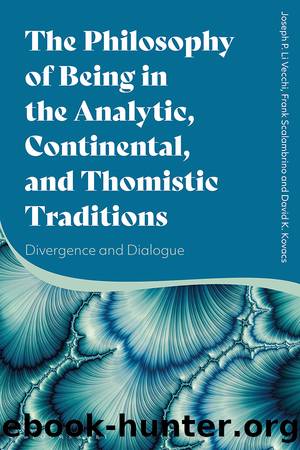The Philosophy of Being in the Analytic, Continental, and Thomistic Traditions by Joseph P. Li Vecchi;Frank Scalambrino;David K. Kovacs;

Author:Joseph P. Li Vecchi;Frank Scalambrino;David K. Kovacs;
Language: eng
Format: epub
Publisher: Bloomsbury UK
5
Conclusion: Being in Three Traditions
Joseph P. Li Vecchi, Frank Scalambrino, and David K. Kovacs
§1 Opening Remarks
We have constructed this final chapter to place our traditions into dialogue, indicating how our respective traditions diverge from one another. Each of us comments on the other two traditions from the point of view of the tradition we represent. Each of us will say what we find problematic about the theory of being proposed in the other two traditions, as well as what we find valuable, and we will each make some effort to defend our tradition from criticisms.
§2 Thomistic Philosophy of Being and the Continental and Analytic Traditions
Joseph P. Li Vecchi
Aquinas never explicitly defends our knowledge of being from what I have characterized in Chapter 2 as âhyperbolic subjectivismâ and âhyperbolic objectivism.â1 Now that this book has addressed some of the principal doctrines of the three traditions concerning being, the present section will provide explicit rebuttals to Continental and Analytic doctrines that contrast with those of the Thomistic philosophy of being. Generally, these rebuttals concern the tension between the objective and subjective poles of knowledge, and the middle path that the Thomistic Tradition steers between these extremes.
2.1 The Thomistic Tradition Regarding Continental Philosophy of Being
Chapter 3 presents a wide range of doctrines and interpretations that constitute developments in continental philosophy of being. The present section focuses its criticisms on what it takes to be the fundamental tenet of Kant and the Continental Tradition that most directly contrasts with Thomistic philosophy of being: the derivation of ontology from an investigation of the conditions of the possibility of knowledge.
2.1.1 The Fundamental Thomistic Critique of the Continental Tradition
Kant famously follows Hume in holding that sensory experience directly yields only knowledge of phenomena, and not of reality.2 Unlike Hume, however, Kant claims that investigation into the conditions of the possibility of knowledge yields an ontology. Kant articulates a complex ontology within the bounds of the knowing subjectâs possible experience that by no means is limited to justifying the phenomenal. Within that ontology, Kant is able to distinguish the knowing subject from the object known, to cast space and time as a priori forms of sensibility, and to justify judgments about reality and being, all within the bounds of possible subjective experience. From the Thomistic perspective, the derivation of this ontology from his investigation of the conditions of the possibility of knowledge is the fundamental tenet of Kantian philosophy and of continental philosophy of being.
2.1.2 Criticizing Continental Philosophy of Being
The ontology that Kant derives from his investigation of the conditions of the possibility of knowledge is fundamentally at odds with Thomistic philosophy of being. In particular, his ontology is limited to the bounds of the knowing subjectâs possible experience, and thus, necessarily excludes knowledge of what he calls âthe noumenon,â or reality in itself.3 All psychological processes transpire exclusively based on sensation as conceived within the architecture of the understanding. Kant presents logical principles, such as the principle of non-contradiction, as laws of understanding that apply to phenomena because of the a priori origin of space and time in sensible experience.
Download
This site does not store any files on its server. We only index and link to content provided by other sites. Please contact the content providers to delete copyright contents if any and email us, we'll remove relevant links or contents immediately.
The remains of the day by Kazuo Ishiguro(7576)
Tools of Titans by Timothy Ferriss(6965)
The Black Swan by Nassim Nicholas Taleb(6204)
Inner Engineering: A Yogi's Guide to Joy by Sadhguru(5910)
Giovanni's Room by James Baldwin(5896)
The Way of Zen by Alan W. Watts(5810)
The Six Wives Of Henry VIII (WOMEN IN HISTORY) by Fraser Antonia(4799)
The Power of Now: A Guide to Spiritual Enlightenment by Eckhart Tolle(4767)
Astrophysics for People in a Hurry by Neil DeGrasse Tyson(4627)
Asking the Right Questions: A Guide to Critical Thinking by M. Neil Browne & Stuart M. Keeley(4599)
12 Rules for Life by Jordan B. Peterson(3745)
The Ethical Slut by Janet W. Hardy(3512)
Skin in the Game by Nassim Nicholas Taleb(3479)
Housekeeping by Marilynne Robinson(3420)
The Art of Happiness by The Dalai Lama(3391)
Double Down (Diary of a Wimpy Kid Book 11) by Jeff Kinney(3285)
Skin in the Game: Hidden Asymmetries in Daily Life by Nassim Nicholas Taleb(3273)
Walking by Henry David Thoreau(3237)
12 Rules for Life: An Antidote to Chaos by Jordan B. Peterson(3209)
